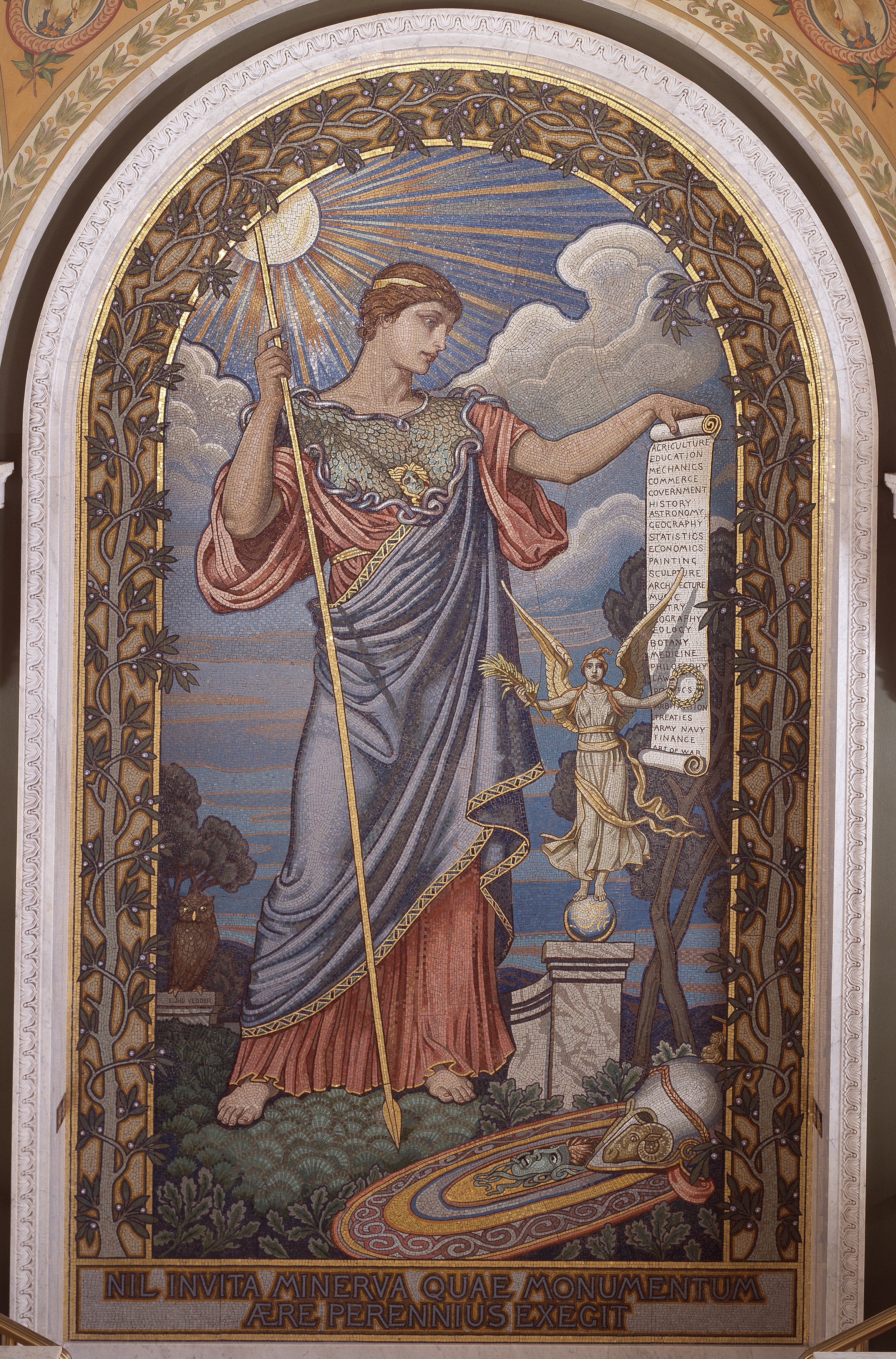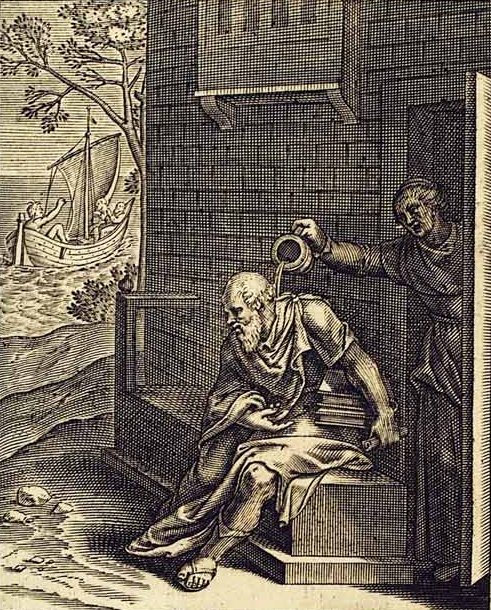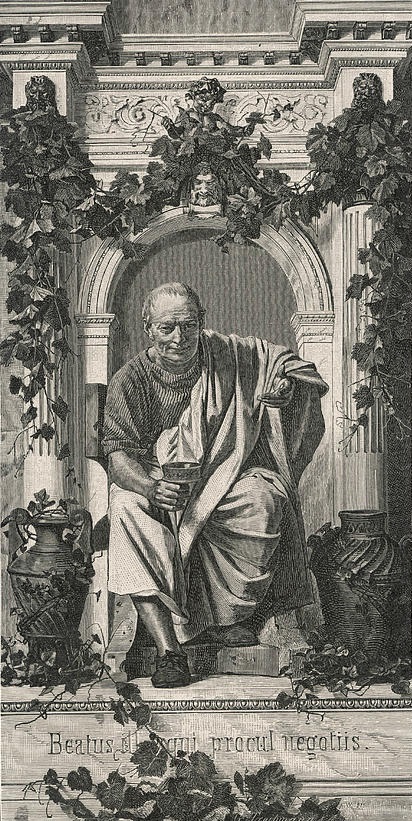|
Horace
Quintus Horatius Flaccus (; 8 December 65 BC – 27 November 8 BC), Suetonius, Life of Horace commonly known in the English-speaking world as Horace (), was the leading Roman lyric poet during the time of Augustus (also known as Octavian). The rhetorician Quintilian regarded his '' Odes'' as the only Latin lyrics worth reading: "He can be lofty sometimes, yet he is also full of charm and grace, versatile in his figures, and felicitously daring in his choice of words."Quintilian 10.1.96. The only other lyrical poet Quintilian thought comparable with Horace was the now obscure poet/metrical theorist, Caesius Bassus (R. Tarrant, ''Ancient Receptions of Horace'', 280) Horace also crafted elegant hexameter verses ('' Satires'' and '' Epistles'') and caustic iambic poetry ('' Epodes''). The hexameters are amusing yet serious works, friendly in tone, leading the ancient satirist Persius to comment: "as his friend laughs, Horace slyly puts his finger on his every fault; once let ... [...More Info...] [...Related Items...] OR: [Wikipedia] [Google] [Baidu] |
Odes (Horace)
The ''Odes'' () are a collection in four books of Latin lyric poetry, lyric poems by Horace. The Horatian ode format and style has been emulated since by other poets. Books 1 to 3 were published in 23 BC. A fourth book, consisting of 15 poems, was published in 13 BC. The ''Odes'' were developed as a conscious imitation of the short lyric poetry of Greek originals – Pindar, Sappho and Alcaeus of Mytilene, Alcaeus are some of Horace's models. His genius lay in applying these older forms to the social life of Rome in the age of Augustus. The ''Odes'' cover a range of subjects – love; friendship; wine; religion; morality; patriotism; poems of eulogy addressed to Augustus and his relations; and verses written on a miscellany of subjects and incidents, including the uncertainty of life, the cultivation of tranquility and contentment, and the observance of moderation or the "Golden mean (philosophy), golden mean." The ''Odes'' have been considered traditionally by English-speaking s ... [...More Info...] [...Related Items...] OR: [Wikipedia] [Google] [Baidu] |
Satires (Horace)
The ''Satires'' ( or ) is a collection of satirical poems written in Latin dactylic hexameters by the Roman poet Horace. Published probably in 35 BC and at the latest, by 33 BC, the first book of Satires represents Horace's first published work. It established him as one of the great poetic talents of the Augustan Age. The second book was published in 30 BC as a sequel. In the first book of his (Latin for "conversations") or (Latin for "miscellaneous poems"), Horace combines Greek philosophy with Roman good sense to convince his readers of the futility and silliness of their ambitions and desires. As an alternative, he proposes a life that is based on the Greek philosophical ideals of ''autarkeia'' (Greek for "inner self-sufficiency") and ''metriotes'' (Greek for "moderation" or sticking to the Just Mean). In 1.6.110–131, Horace illustrates what he means by describing a typical day in his own simple, but contented life. The second book also addresses the fundamental ques ... [...More Info...] [...Related Items...] OR: [Wikipedia] [Google] [Baidu] |
Epodes (Horace)
The ''Epodes'' ( or ''Epodon liber''; also called ''Iambi'') are a collection of iambic poems written by the Roman poet Horace. They were published in 30 BC and form part of his early work alongside the '' Satires''. Following the model of the Greek poets Archilochus and Hipponax, the ''Epodes'' largely fall into the genre of blame poetry, which seeks to discredit and humiliate its targets. The 17 poems of the ''Epodes'' cover a variety of topics, including politics, magic, eroticism and food. A product of the turbulent final years of the Roman Republic, the collection is known for its striking depiction of Rome's socio-political ills in a time of great upheaval. Due to their recurring coarseness and explicit treatment of sexuality, the ''Epodes'' have traditionally been Horace's least regarded work. However, the last quarter of the 20th century saw a resurgence in scholarly interest in the collection. Names The modern standard name for the collection is ''Epodes''. Deri ... [...More Info...] [...Related Items...] OR: [Wikipedia] [Google] [Baidu] |
Epistles (Horace)
The ''Epistles'' (or ''Letters'') of Horace were published in two books, in 20 BC and 14 BC, respectively. *''Epistularum liber primus'' (''First Book of Letters'') is the seventh work by Horace, published in the year 20 BC. This book consists of 20 Epistles. *''Epistularum liber secundus'' (''Second Book of Letters'') was published in the year 14 BC. This book consists of 3 Epistles. However, the third epistle – the Ars Poetica – is usually treated as a separate composition. Background As one commentator has put it: "Horace's ''Epistles'' may be said to be a continuation of his Satires in the form of letters... But few of the epistles are ctuallyletters except in form..."The Works of Horace Rendered into English Prose by James Lonsdale M.A. and Samuel Lee M.A. London: MacMillan and Co., 1883. Edition is available on Google Books. They do indeed contain an excellent specimen of a letter of introduction (I.9); a piece of playful banter (I.14); pieces of friendly corresp ... [...More Info...] [...Related Items...] OR: [Wikipedia] [Google] [Baidu] |
Iambus (genre)
Iambus or iambic poetry was a genre of Greek lyric, ancient Greek poetry that included but was not restricted to the Iamb (foot), iambic meter and whose origins modern scholars have traced to the cults of Demeter and Dionysus. The genre featured insulting and obscene language and sometimes it is referred to as "blame poetry". For Alexandrian period, Alexandrian editors, however, iambus signified any poetry of an informal kind that was intended to entertain, and it seems to have been performed on similar occasions as elegy even though lacking elegy's decorum. The Archaic Greece, Archaic Greek poets Archilochus, Semonides and Hipponax were among the most famous of its early exponents. The Alexandrian period, Alexandrian poet Callimachus composed "iambic" poems against contemporary scholars, which were collected in an edition of about a thousand lines, of which fragments of thirteen poems survive. He in turn influenced Roman poets such as Catullus, who composed satirical epigrams that ... [...More Info...] [...Related Items...] OR: [Wikipedia] [Google] [Baidu] |
Ars Poetica (Horace)
"Ars Poetica", or "The Art of Poetry" , sometimes referred to as the ''"Epistula ad Pisones"'', or "Epistle to the Pisos", is a poem written by Horace c. 19 BC, in which he advises poets on the art of writing poetry and drama. The ''Ars Poetica'' has "exercised a great influence in later ages on European literature, notably on French drama", and has inspired poets and authors since it was written. Although it has been well-known since the Middle Ages, it has been used in literary criticism since the Renaissance. Background The poem was written in hexameter verse as an Epistle (or Letter) to Lucius Calpurnius Piso (the Roman senator and consul) and his two sons, and is sometimes referred to as the ''Epistula ad Pisones'', or "Epistle to the Pisos". The first mention of its name as the "''Ars Poetica''" was c. 95 by the classical literary critic Quintilian in his ''Institutio Oratoria'', and since then it has been known by that name. The translations of the original epistle are typi ... [...More Info...] [...Related Items...] OR: [Wikipedia] [Google] [Baidu] |
Maecenas
Gaius Cilnius Maecenas ( 13 April 68 BC – 8 BC) was a friend and political advisor to Octavian (who later reigned as emperor Augustus). He was also an important patron for the new generation of Augustan poets, including both Horace and Virgil. In many languages, his name is an eponym for "patron of arts". During the reign of Augustus, Maecenas served as a quasi-culture minister to the Roman emperor but in spite of his wealth and power he chose not to enter the Roman Senate, Senate, remaining of Equites, equestrian rank. Life Expressions in Propertius seem to imply that Maecenas had taken some part in the campaigns of Battle of Mutina, Mutina, Battle of Philippi, Philippi, and Battle of Perugia, Perugia. He prided himself on his ancient Etruscan civilization, Etruscan lineage, and claimed descent from the princely house of the Cilnia (gens), Cilnii, who excited the jealousy of their townsmen by their preponderant wealth and influence at Arretium in the 4th century BC. Horace mak ... [...More Info...] [...Related Items...] OR: [Wikipedia] [Google] [Baidu] |
Prosody (Latin)
Latin prosody (from Middle French ''prosodie'', from Latin ''prosōdia'', from Ancient Greek προσῳδία ''prosōidía'', 'song sung to music', 'pronunciation of syllable') is the study of Latin poetry and its laws of meter. The following article provides an overview of those laws as practised by Latin poets in the late Roman Republic and early Roman Empire, with verses by Catullus, Horace, Virgil and Ovid as models. Except for the early Saturnian (poetry), Saturnian poetry, which may have been accentual, Latin poets borrowed all their verse forms from the Greeks, despite significant differences between the two languages. Latin verse: a Greek gift A brief history The start of Latin literature is usually dated to the first performance of a play by Livius Andronicus in Rome in 240 BC. Livius, a Greek slave, translated Greek New Comedy for Roman audiences. He not only established the genre fabula palliata, but also adapted meters from Greek drama to meet the needs of Latin ... [...More Info...] [...Related Items...] OR: [Wikipedia] [Google] [Baidu] |
Niall Rudd
William James Niall Rudd (23 June 1927 – 5 October 2015) was an Irish-born British classical scholar. Life and work Rudd was born in Dublin and studied Classics at Trinity College, Dublin. He then taught Latin at the Universities of Hull and Manchester. From 1958 to 1968 he was Associate Professor of Latin at University College, Toronto. In 1968 he returned to England and taught for five years as a professor of Latin at the University of Liverpool. In 1973 he moved to the University of Bristol to the chair of Latin, where he remained until his retirement in 1989. From 1976 to 1979 he was Director (Head of Department) of the Department of Classics and Archaeology. After retirement Rudd returned to Liverpool and was appointed an Honorary Research Fellow there. Trinity College Dublin awarded him an honorary doctorate in 1998 (DLitt). Rudd died of Melanoma after a long illness ( Alzheimer's) on 5 October 2015 at St. John's Hospice on the Wirral. Rudd worked intensively with ... [...More Info...] [...Related Items...] OR: [Wikipedia] [Google] [Baidu] |
Horatii Flacci Sermonum
In the ancient Roman legend of the regal period, the Horatii were three sibling warriors, sons of Publius Horatius, who lived during the reign of Tullus Hostilius. The accounts of their epic clash with the Curiatii appear in the writings of Livy.The names ''Horatii'' and ''Curiatii'' are derived from the plural of their surnames: "''Horatius'', and "'' Curiatius''. The English equivalents could be "the Horatius Brothers" and "The Curiatius Brothers". The story includes Publius Horatius, the sole survivor of the battle, murdering his sister for mourning the death of a beloved Curiatius. War with Alba Longa Livy recounts this tale in the first book of his ''Ab urbe condita''. During the Roman king Tullus Hostilius' war with the neighboring city of Alba Longa, it was agreed that fighting a costly war between their armies would leave the door open for an Etruscan invasion. Sabine dictator Mettius Fufetius appealed to Tullus Hostilius that the conflict should be settled by a ... [...More Info...] [...Related Items...] OR: [Wikipedia] [Google] [Baidu] |
Persius
Aulus Persius Flaccus (; 4 December 3424 November 62 AD) was a Roman poet and satirist of Etruscan origin. In his works, poems and satire, he shows a Stoic wisdom and a strong criticism for what he considered to be the stylistic abuses of his poetic contemporaries. His works, which became very popular in the Middle Ages, were published after his death by his friend and mentor, the Stoic philosopher Lucius Annaeus Cornutus. Life According to the ''Life'' contained in the manuscripts, Persius was born into an equestrian family at Volterra (Volaterrae, in Latin), a small Etruscan city in the province of Pisa, of good stock on both parents' side. When he was six years old he lost his father; his stepfather died a few years later. At the age of twelve Persius came to Rome, where he was taught by Remmius Palaemon and the rhetor Verginius Flavus. During the next four years he developed friendships with the Stoic Lucius Annaeus Cornutus, the lyric poet Caesius Bassus and the poet ... [...More Info...] [...Related Items...] OR: [Wikipedia] [Google] [Baidu] |
Canusium
Canosa di Puglia, generally known simply as Canosa (), is a town and ''comune'' in the province of Barletta-Andria-Trani, Apulia, southern Italy. It is located between Bari and Foggia, on the northwestern edge of the plateau of the Altopiano delle Murge, Murgia which dominates the Ofanto valley and the extensive plains of Tavoliere delle Puglie, ranging from Mount Vulture at the Gargano, to the Adriatic coast. Canosa, the Roman Canusium, is considered the principal archaeology, archaeological center of Apulia, and is one of the oldest continually inhabited cities in Italy.Soprintendenza per i beni archeologici della Puglia, Marisa Corrente (a cura di) 1912 un ipogeo al confine: tomba Varrese: Canosa di Puglia, Palazzo Sinesi, 22 ottobre 2000, Canosa di Puglia, Serimed, 2001 A number of vases and other archaeological finds are located in local museums and private collections. It is not far from the position on the Ofanto River where the Romans found refuge after the defeat of the B ... [...More Info...] [...Related Items...] OR: [Wikipedia] [Google] [Baidu] |






